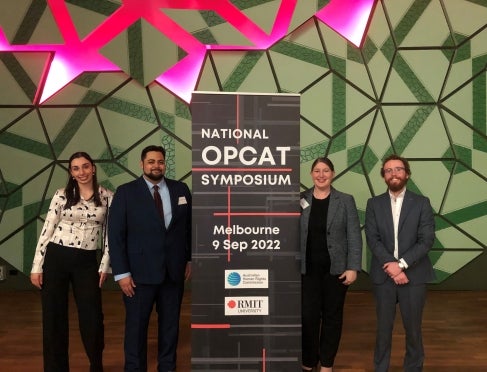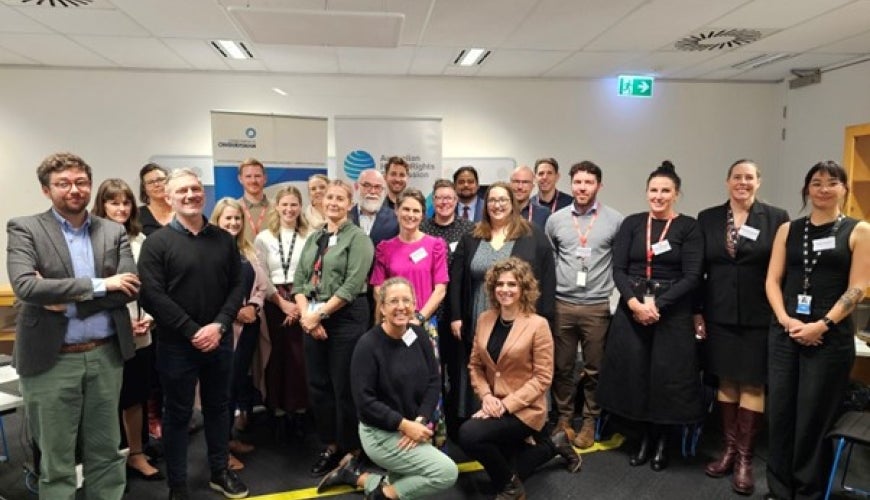OPCAT: Optional Protocol to the Convention against Torture

Optional Protocol to the Convention Against Torture and Other Cruel, Inhuman or Degrading Treatment or Punishment (OPCAT)
The Optional Protocol to the Convention against Torture and Other Cruel, Inhuman or Degrading Treatment or Punishment (OPCAT) is an international agreement aimed at preventing torture and cruel, inhuman or degrading treatment or punishment. OPCAT was adopted in 2002 and entered into force in 2006. OPCAT is a human rights treaty that assists in the implementation of and builds on the United Nations Convention against Torture and Other Cruel, Inhuman or Degrading Treatment (CAT) and helps States meet their obligations under CAT. The objective of OPCAT is to prevent the mistreatment of people in detention.
Under OPCAT, State Parties agree to establish an independent National Preventive Mechanism (NPM) to conduct inspections of all places of detention and closed environments. In addition to the NPM, State Parties also agree to international inspections of places of detention by the United Nations Subcommittee on the Prevention of Torture (SPT). The SPT engages with states on a confidential basis and cannot publish reports and recommendations unless under agreement with the State Party. Furthermore, people who provide information to the SPT may not be subject to sanctions or reprisals for having done so.
This OPCAT - the torture prevention treaty video the Association for the Prevention of Torture provides a useful overview of OPCAT.
What is the status of OPCAT in Australia?
Australia has signed and ratified CAT. CAT sets out the core obligations to prevent torture and other forms of mistreatment. On May 19, 2009, the Australian Government signed OPCAT. On February 9, 2017, the Australian Government announced its intention to ratify OPCAT, and in December 2017 the instruments of ratification were lodged with the UN. In signing and ratifying OPCAT, the Australian Government took a significant step towards establishing enhanced oversight of Australian places of detention, and improvement in conditions.
Upon ratification, Australia immediately made a declaration under Article 24 of OPCAT delaying its obligation to establish an NPM for three years. This extension was scheduled to formally end on January 20, 2022.
On December 20, 2021, the Australian Government formally requested a postponement for an additional year. The main reasons cited for the request were the COVID-19 pandemic and considerations relating to Australia’s federated system of government. The formal request was granted by the UN Committee against Torture (UN Committee), and January 20, 2023, was set as the new date for compliance.
See the Human Rights Commissioners statement regarding the missed deadline.
The Australian Government has elected to adopt a multiple-body monitoring system with the Commonwealth, States and Territories asked to designate their own NPM(s) within their relevant jurisdictions. The Office of the Commonwealth Ombudsman has been nominated by the Australian Government as the NPM Coordinator, being tasked with coordinating the Australian NPM Network. At the time of writing, only five jurisdictions, in addition to the Australian Government, have nominated or proposed nomination for their NPMs. New South Wales, Queensland, and Victoria have yet to designate their NPMs.
In October 2022 a delegation from the SPT suspended its first tour of Australia after being refused entry to places of detention in New South Wales and Queensland. The SPT took the extraordinary step of then terminating the visit on 20 February 2023. Rwanda is the only other country ever to have had such a visit terminated.
See the Commissions statements on the SPT visit suspension and termination.
The Commission's work in relation to OPCAT
While the Commission is not a designated NPM or NPM-coordinator (and therefore has no formal implementation responsibilities), continuing to promote OPCAT compliance and providing an independent perspective on the actions Australia needs to take to ensure compliance with our international human rights obligations under OPCAT falls within our broader statutory mandate. The Commission has long advocated for full compliance with OPCAT noting that ‘merely adjusting the current processes for detention inspections cannot be an end in itself. Instead, the changes required by OPCAT should be pursued in a way that promotes stronger and more consistent human rights protections for people who are detained across all jurisdictions.
The Commission has had a long history of advocating for the ratification and implementation of OPCAT in Australia. In 2009, the Commission hosted a seminar with the Asia Pacific Forum of National Human Rights Institutions on OPCAT implementation which built on the 2008 report by Professors Neil Morgan and Richard Harding, Implementing the Optional Protocol to the Convention Against Torture: Options for Australia. The Commission made a submission to the Joint Standing Committee on Treaties, noting that ‘OPCAT is an important human rights treaty. Becoming a party to this treaty will lead to enhanced human rights protections for some of the most vulnerable people in Australia.’
In 2016, the then Children’s Commissioner examined OPCAT in the context of children and young people detained in youth justice centres or adult facilities in her Children’s Rights Report 2016.
Implementing OPCAT in Australia (2020)
In February 2017, the then Commonwealth Attorney-General invited the Commission to lead a consultation on how Australia should implement OPCAT. On June 29, 2020, the Commission published Implementing OPCAT in Australia. This was the final step for the Commission’s OPCAT project, and followed extensive consultations conducted by the Commission in 2017 and 2018. The final report contained 17 recommendations as to how Australia should implement OPCAT.
The OPCAT Consultation page provides more detail.
The First Phase of the Project submissions is located on the OPCAT Civil Society Consultation page.
The Second Phase of the Project submissions is located on the OPCAT in Australia Consultation page.
National OPCAT Symposium (2022)
On September 9, 2022, the Commission partnered with the RMIT University College of Business and Law to hold a National OPCAT Symposium in Melbourne. The symposium's aim was to provide an opportunity to bring together relevant stakeholders from the Australian, state and territory governments, oversight and statutory bodies and civil society, to take stock of what has been achieved to date, identify any existing barriers to progress and work out what needs to be done to reach full compliance by the extended deadline of January 20, 2023.
The Symposium successfully brought together just under 200 people from government departments, civil society, and academia. In attendance also were representatives of 43 statutory oversight agencies and commissions of enquiry from across Australia and Aotearoa New Zealand. Watch the National OPCAT Symposium
Human Rights Commissioner Lorraine Finlay (third from left) with members of her team Jennifer Katrib, Steven Caruana and Patrick Hooton.
Several prominent speakers hosted the Symposium, including:
- Dr Alice Edwards, UN Special Rapporteur on Torture
- Aisha Shujune Muhammed, Vice Chairperson for NPMs, UN Subcommittee on the Prevention on Torture
- Wendy Sinclair-Gieben, Chairperson of the UK NPM and HM Chief Inspector of Prisons for Scotland
- Iain Anderson, Australia's Commonwealth Ombudsman
- Dr John Chesterman, Queensland Public Advocate
The overwhelming attitude from those attending the Symposium was that simply ensuring minimal compliance by the deadline would not be enough – instead, Australia should aim to develop best practice in our approach to OPCAT and demonstrate leadership in our implementation of our OPCAT obligations.
Road Map to OPCAT Compliance (2022)
The Commission released a report outlining activities required to expedite Australia’s approach to implementing the OPCAT.
Informed by our National OPCAT Symposium, the Road Map to OPCAT Compliance provided a clear pathway for governments across Australia to meet the deadline for OPCAT compliance.
Since ratification in 2017, the deadline for Australia’s OPACT implementation process was extended until January 20, 2023. To meet this deadline, a significant amount of work still needs to be finalised to enable relevant authorities to comply with their OPCAT obligations.
The Road Map to OPCAT Compliance report contained key information and principles as well as five recommendations to help guide the implementation process.
A copy of the report was sent to the SPT as well as individuals, agencies, departments and organisations in Australia which were involved with the OPCAT implementation process.
The release of the report coincided with the visit to Australia by a UN SPT delegation from 16 – 27 October 2022.
- Read/download report:
- Read/download the infographic summary:
Australian NPM Training Workshop (2024)
In May 2024, the Commission partnered with the Association for the Prevention of Torture (APT), United Kingdom NPM and the Commonwealth Ombudsman to facilitate a training workshop for existing members of Australia’s NPM.
The workshop brought together 31 participants representing 12 NPM organisations across Australia and live streaming was provided to enable participants from the New Zealand NPM to also attend.
Submissions
On 15 November 2023, the Commission made a submission to the United Nations Special Rapporteur on Torture’s consultation on current issues and good practices in prison management.
On 15 September 2023, the Commission made a submission as part of the follow up procedures to Australia's Sixth Periodic Review Submission to the Committee Against Torture.
On March 24, 2023, the Commission made a submission to the Queensland Ombudsman and Inspector of Detention Services' consultation on inspection standards for youth detention centres and prisons.
On January 9, 2023, the Commission made a submission to the Queensland Legal Affairs and Safety Committee with respect to its consideration of the Monitoring of Places of Detention (Optional Protocol to the Convention Against Torture) Bill 2022 (Bill).
On October 3, 2022, the Commission made a submission to the UN Committee ahead of Australia's sixth periodic review.
On September 23, 2022, the Commission made a submission to the Royal Commission into Violence, Abuse, Neglect and Exploitation of People with Disability entitled National Preventive Mechanisms: a formal safeguard for people with Disability.
On February 4, 2022, the Commission made a submission to the Northern Territory Department of the Attorney-General and Justice with respect to its consultation on the draft Monitoring of Places of Detention (Optional Protocol to the Convention Against Torture) Amendment Bill 2022 (Bill).
Useful links
United Nations Links
- The Subcommittee on Prevention of Torture
- Committee against Torture
- Outline of a regular SPT visit
- Annual reports submitted by the SPT to the Committee Against Torture
- Annual Reports received from NPMs by SPT
Australia and OPCAT links
- Commonwealth Ombudsman - OPCAT
- Tasmanian NPM
- ACT NPM
- Commonwealth Ombudsman – OPCAT Readiness Report (2019)
OPCAT and Prevention of Torture
- Council of Europe’s Committee for the Prevention of Torture and Inhuman or Degrading Treatment or Punishment
- Association for the Prevention of Torture (APT)
- Copenhagen-Kyiv Declaration (GAHNRI, 2023)
NPMs
- List of all NPMs and their reports (APT OPCAT Database)
- New Zealand Human Rights Commission’s webpage about OPCAT
- UK NPM


